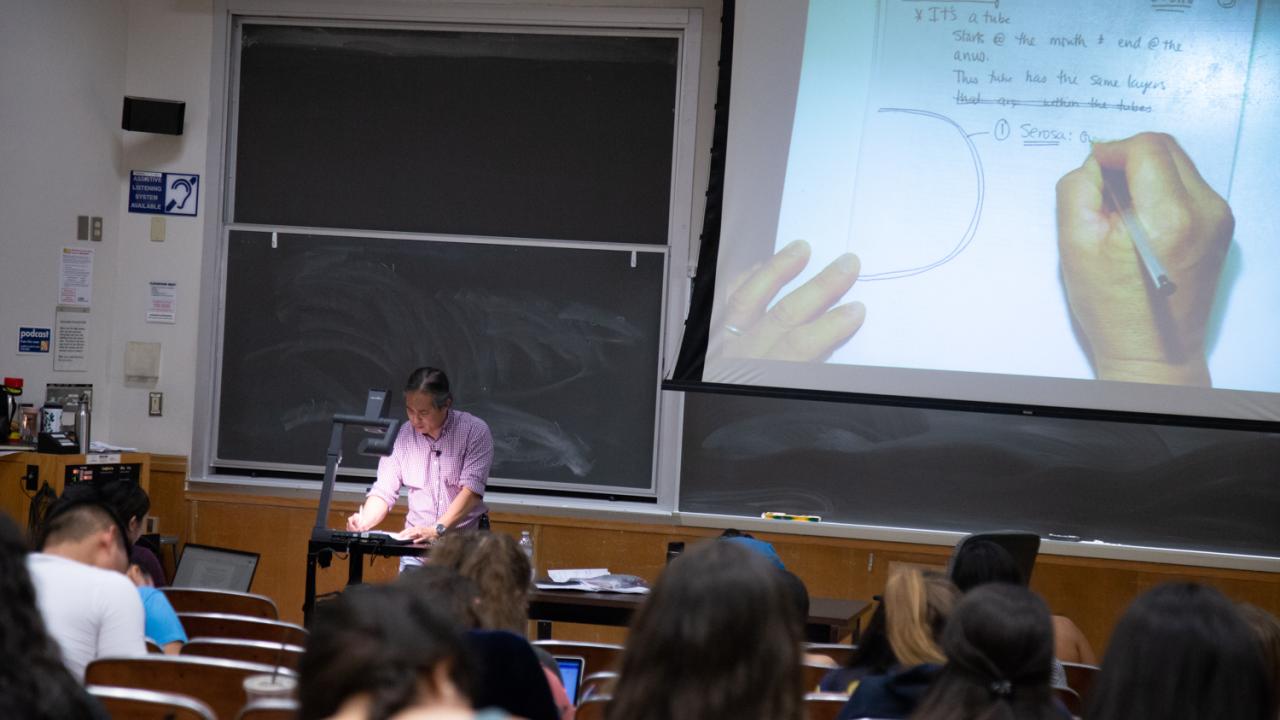
Discovering Curiosity: Erwin Bautista Leads the Classroom
Quick Summary
- Erwin Bautista earned a Ph.D. in physiology from UC Davis
- He's taught an array of classes, from gastrointestinal physiology to comparative organology
- Bautista uses enthusiasm to help convey complex biological concepts to his students
When Erwin Bautista, a lecturer in the Department of Neurobiology, Physiology and Behavior, looks at the human body, he doesn’t see just the individual parts—the cells, organs, tissues, muscles and bones—he sees the sum.
“Whenever I teach things, I always tell students that physiologists love acronyms,” said Bautista. “We love naming things; we love all these itty-bitty points and details. But at the same time, we also love the big picture, and we’re going to try to impress upon you the big picture.”
For Bautista, teaching is a calling. Students place their trust in his hands, and it’s his responsibility to shepherd their knowledge of biological concepts. With more than 15 years of experience at UC Davis, he’s taught an array of classes, from gastrointestinal physiology to comparative organology.
“We all have an obligation for service,” he said. “I really dig the fact that when people talk about the biggest influences in their lives, they mention teachers. So it’s a huge responsibility. It’s kind of scary and thrilling at the same time, but I like the fact that I can really have a positive impact on people.”

Contagious excitement, the instructor’s greatest tool
In conversation, it’s easy to see the traits that make Bautista a top-tier instructor. His excitement about cerebral concepts is contagious, and he speaks in a stream of consciousness-like manner, as if laying bare the inner workings of his mind.
Lily O’Connor-Coates, a cognitive science and communication dual major who took Bautista’s elementary human physiology course, said she felt Bautista broadened the appeal of the material, presenting clearly and enthusiastically for students new to the subject.
“Positive attitude and energy can go a long way in making a class pay attention and I think he embodies that,” O’Connor-Coates said. “He tells jokes, gets the class laughing and then continues to explain and diagram notes.”
“He kept the class entertained even while talking about the digestive system,” she added.
For Bautista, that’s what it’s all about. Inspiring a drive to learn in his students.
Diving into a sea of research

Bautista started his career at UC Davis as a Physiology Graduate Group Ph.D. student, working in the lab of Distinguished Professor Emerita Barbara Horwitz. Together, they studied energy balance and obesity in rats and hamsters, investigating the relationship between caloric intake and energy expenditure.
For decades, scientists hypothesized that the body’s energy intake/output balancing was controlled by a region of the brain called the hypothalamus. However, the key signaling molecules detected by the hypothalamus had yet to be identified. As a member of the Horwitz lab, Bautista joined the search, investigating the phenomena in the genetically obese Zucker rat, a model of heritable obesity.
In 1994, while Bautista worked on his project, the laboratory of Jeffrey Friedman at the Rockefeller University released what Bautista referred to as a “revolutionary paper” identifying leptin, a hormone released by white adipose tissue—a kind of body fat—that played a central role in energy balance.
“Leptin tends to inhibit food intake,” said Bautista. “So if leptin were injected into a normal rat, it would decrease their food intake and increase their burning of calories. And if the rat were given repeated leptin treatments for a period of weeks, the hormone would cause long-lasting body weight reductions.”
But this didn’t always play out in practice. Some genetically obese rodent models, like the Zucker rat, displayed no behavioral or metabolic changes despite leptin injections. They just kept gorging and maintained their obesity. It turned out that the receptor for leptin was non-functional in the Zucker rat, causing it to be unresponsive to this hormone, which resulted in its severe obesity.
A pivot from research to teaching
In 2001, Bautista earned a Ph.D. in physiology from UC Davis. By that time, he’d become more enchanted with educating through his experiences as a graduate student teaching assistant.
“I’ve always had this real love of teaching, and my time spent as a teaching assistant was eye-opening,” he said. “I find it very meaningful when discussing and explaining some concept to my students that they experience an ‘Ah-ha’ moment of understanding. It’s wonderful to be involved in that journey.”
He continued at UC Davis as a postdoctoral researcher but kept teaching in his sights. When the opportunity arose, Bautista joined the college’s faculty as a lecturer and quickly made an impression students and colleagues alike. Over the years, he’s earned several teaching awards, all while fostering the development of the neurobiology, physiology and behavior course catalog.
When giving lectures on body processes, Bautista often pairs the lessons with videos showing normal, or even abnormal, body function. “I find that I can get the concepts to stick in my students’ minds with just a simple video,” said Bautista. “Videos often spark more curiosity and begin deeper conversations on that lecture topic.”
Today, Bautista teaches classes with as many as 500 students, an ambitious amount of minds to keep engaged. Bautista wants to help his students connect the small dots so they can see the big picture. And that’s a philosophy he carries with him in his day-to-day life.
“As we find our callings, we have to remind ourselves that somehow it’s going to contribute to the whole,” he said.

